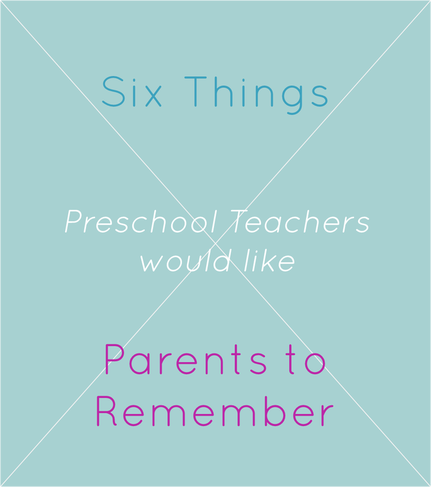All this school-related social media activity did, however, bring back memories of what it’s like to be on the other side: the teacher. So while you mop up your tears and say a definitive goodbye to the baby days, here is what the teachers will be hoping you remember.
Home: one-on-one attention aplenty with people who have tended to the child's every whim since birth.
School: 10, 20 or even 30 other children need to be kept fed, watered and educated by one or two poor souls.
They cannot be the same. Different environment, different rules, different results. This is why your normally outgoing child may become quiet or vice versa, why they eat their carrots at school but fling them skywards at home, why they cling to your leg like a monkey in the morning but seem reluctant to say goodbye to their friends four hours later. None of this is cause for concern - peer pressure (in the positive sense) is a huge motivator, and in any case your child is simply adapting to the environment.
The only time when you need to talk to the teacher is if there is a sudden, disproportional and persistent onset of undesirable (such as hitting) or worrisome (such as refusing to eat or becoming excessively withdrawn) behaviour. Though a settling-in period is normal, as is letting off steam with an emotional outburst now and then, large and negative changes in behaviour may indicate that something is seriously bothering your child.
2. Your children are more independent than you think they are
I have lost count of the number of children I’ve seen put on their own shoes, feed themselves, or go to the loo unprompted while at school, only to turn into helpless “babies” the second their parents walk through the door. 99% percent of the time the parent simply hasn’t realised just how much their child is capable of. And then that child will happily take full advantage of this ignorance, much to the dismay of the teacher. Especially if it’s a way of getting attention from someone they haven’t seen all day. The teacher’s advice? ALWAYS let them try by themselves first, even when you think they're too young, and only give help when it’s requested.
3. Don’t play the Alpha-parent game
The one who dresses their child in expensive, brand-new clothes for a day of mucking about. The one who gets up at 5am to cut lunch box sandwiches into pretty animal shapes. The one who points out how many gold stars their child has earned this week within earshot of the mum whose kid is climbing the furniture.
While in theory these things are okay - to have the cash or the time, to feel proud of your child’s achievements - parents are highly competitive animals who are already overly prone to comparing. Endless, destructive comparing. And unfortunately, this comparing and competing usually ends up back on the teacher’s desk in the form of complaints and impossible requests to make things equal. Guess what? We can’t. So take the lazy option and just don’t play the game.
Yes, Johnny might be going up a numeracy group before your child does, despite them being the same age. Or the teacher may be spending 5 minutes talking to Sarah’s mum every morning, but not to you. And you might find this unsettling or even hugely unfair.
So while I know you know this, it merits repeating: all children are different. Teachers, therefore, cannot be expected to treat every child in exactly the same way. In fact, you don’t want them to, because children learn best when their individual needs are interests are put first. Because good teachers are the ones who help the slower children to catch up, rather than take the easy option and flaunt the results of already capable pupils.
In any case, your child will almost certainly have other skills that little Johnny doesn’t, and there may be something awful going on in Sarah’s family that you don’t know about. So don’t feel aggrieved or slighted about what is happening to others, but do ask questions about how your own child, the sole focus of your concern, is doing.
5. Work with us, not against us
We have no problem with teaching your child to brush their teeth, pack up their toys or tie their shoelaces. Teaching them life skills is just as much part of our job as it is to teach them their abcs. But for the love of god, don’t neglect to practise these skills at home. Despite home and school being different environments (see point 1), some skills are useful everywhere. In these situations consistency is key, and presenting a united front with the teachers will only benefit everyone in the long run.
Working with us involves communicating, too. Tell us when you're unhappy or concerned about something rather than suffering in silence or, worse, complaining to another parent who is unlikely to be able to help. Tell us when something big is happening in your child's life: a new sibling, a family crisis, anything that is likely to have an impact on their behaviour. We want you to do these things because at the end of the day our goal is the same: to help raise a child who is happy to learn, to play, to develop.
6. Don’t be too hard on yourself
Being a parent is hard. Parents are the ones who have to deal with the sugar high after the party, the meltdown when the car is stuck in traffic, the feverish nights before another day at the office. It’s okay to be in a rush in the morning. We will not judge you when you forget the lunch box or the gym kit. It's normal to feel overwhelmed by the changes, to despair at having to say goodbye. Because nobody is immune to the tough days. Not even a former preschool teacher who routinely got twenty-four 2-year-olds to sit on their chairs at the same time, but who is putty in the hands of her own toddler. Who will probably, come to think of it, be unable to stick to any of the above when the time comes to say her own tearful goodbye at the school gates.















